Aluminum formwork systems have become widely used in construction. They provide lightweight prefabricated molds for both residential construction and public construction projects. Among them, factory construction is a typical application of aluminium formwork systems. Read on to learn about the basic criteria for factory construction and how these systems contribute to such projects.

There are some basic criteria for the construction of factories. These include:
Structural Safety
Structural integrity is the cornerstone of any construction endeavor. It ensures that the buildings can withstand the rigors of its intended use. In factories where heavy machinery and equipment are commonplace, structural integrity is non-negotiable. An aluminium formwork system stands out as a solution. The assembly of aluminium formwork doesn’t depend on the proficiency of workers; instead, it provides clear assembly guidelines and acceptance specifications. This ensures consistent construction quality.
Occupational Safety
Construction sites are bustling hubs of activity in which occupational safety is paramount. The safety and well-being of workers become essential. This can be achieved through aluminium formwork systems, which can reduce onsite cutting by over 95% and help maintain a clean and tidy construction site.
Economical Construction
Cost-effectiveness is a crucial criterion for any construction project, and factories are no exception. Reducing labor or material waste is essential, especially for projects with budget constraints. For example, choosing an aluminium formwork system largely contributes to cost savings, as it helps reduce costs on materials procurement, junk removal, labor, and the need for repairs and refinishing.
The stringent requirements of factory construction call for reliable formwork solutions. Aluminium formwork systems provide many key advantages:
High Reliability
An aluminium formwork system offers high reliability. Its lightweight yet rigid panel design provides a stable subsurface to support wet concrete during the pouring and curing stages. This means guaranteed structural safety without defects.
Neat Construction Environment
Aluminium formwork is precisely prefabricated and eliminates the need for onsite alternation. This minimizes clutter and debris and contributes to a cleaner and more organized working environment. The neat and organized working environments also mitigate risks of tripping or falling over scattered materials.
Light Weight
Another critical advantage of aluminium formwork system is its light weight. The lightness and portability of individual aluminium panels allow components to be efficiently transported and rapidly erected or stripped down. Less heavy lifting equipment is required. The risks of injuries and strains that often accompany heavy lifting tasks are minimized.
Reusable Design
Aluminium formwork systems are highly reusable. They can withstand multiple uses without compromising structural integrity or performance. This not only contributes to construction waste reduction but also significant cost savings.
An aluminium formwork system features a lightweight and reusable design. It provides high reliability and contributes to organized construction sites. These advantages make the aluminium formwork systems highly usable in factory construction. Yet, the success of construction projects still involves collaborating with reputed formwork suppliers.

As a leading formwork company, GETO has years of experience in manufacturing innovative building materials. We are known for our success in extensive infrastructure and construction projects worldwide. Our aluminium formwork systems deliver high performance, durability, and advanced technological qualities.
Our GT-48 Lightweight Industrial Formwork System is perfect for factory construction. Their advantages include:
Overall, aluminium formwork systems stand out as a reliable solution for factory construction. They provide key advantages to meet the needs of structural safety, occupational safety, and economical construction. However, to fully realize these gains, it is important that contractors source reliable, premium-grade systems and resources from established experts.
At GETO, we uphold strict manufacturing standards and provide comprehensive technical support. Our GT-48 Lightweight Industrial Formwork System is a testament to our commitment. Browse our website for more about our construction solutions and comprehensive services.
Aluminum formwork systems have seen broad use in construction due to their benefits over traditional timber and steel formwork. An aluminum system gives builders a functional solution, delivering precision, speed, safety, and sustainability on projects big and small. It enables fast, efficient building of walls, columns, and slabs through lightweight yet sturdy aluminum panels. This pioneering aluminium formwork system technology has massively boosted construction productivity globally.

There are two primary aluminium formwork system types used in building construction. Each caters to different project requirements by fulfilling the structural and functional needs of a wide variety of construction projects. The types include:
This formwork system features internal connectors and flat ties to fix formwork panels together. It requires less accessories for assembly and provides higher precision. Without tie-rod holes, it achieves a smoother concrete surface finish.
With external connectors and tie rods passing through the panels, the tie-rod aluminium formwork system delivers high strength and stability essential for renovation projects or structures with a wall thickness of over 400mm. Its versatility enables formwork refurbishment and repeated usage on multiple floors of high-rise buildings.
Panels, connectors, and bracing elements are the core component categories of an aluminium formwork system. These components work together to enable smooth construction.
Panels act as the main load-bearing parts and come in various types to serve different purposes. Wall panels are the most commonly used and contain tie rod holes for the construction of walls. Wall top panels are utilized for the tops of walls. Column panels form the molds for column construction. Crane-way panels provide paths for cranes to travel on during high-rise building works.
Connectors play a vital joining role. External joint connectors fix panels on the outside of structures. Internal joint connectors are used between adjacent panels from inside. Beam corner joints connect wall and beam panels at angled positions. The sturdy designs of these connectors guarantee panels are firmly interlocked and free of gaps or misalignment.
Temporary bracing elements provide crucial stability to support beams, roofs, and more during construction. Kicker braces support the base of beams. Soffit braces are attached to slab undersides. Semi-circular rocker braces resist uneven loading on curved structures. The adjustable bracing connections conform to irregular profiles and deliver maximum safety even under high load conditions.
The premier formwork company GETO has years of experience designing and manufacturing world-class aluminium formwork system solutions. We are committed to innovation and sustainability, with 10 production bases and large annual capacity. Our one-stop solutions include formwork, scaffolding, precast components, and more. Developing new products and solutions to maximize construction efficiency is the key strength that sets us apart from the competition.
At GETO, we provide comprehensive aluminium formwork system solutions and whole-chain services, including system design, formwork material provision, scaffolding solutions, equipment leasing, technical training, and maintenance support. Customers benefit from our:
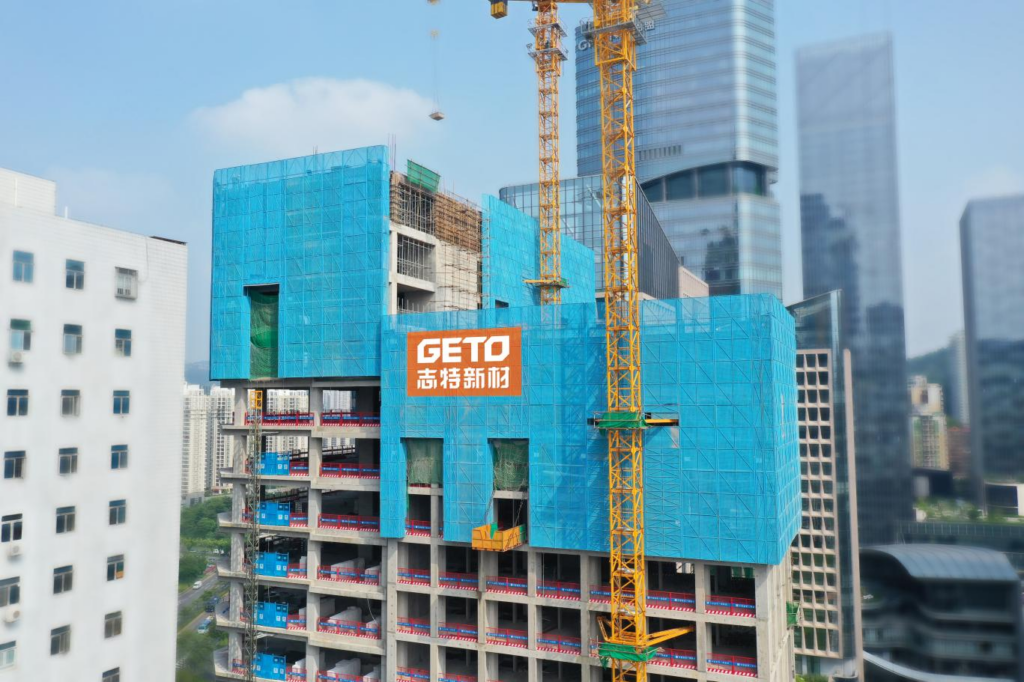
Overall, aluminium formwork systems have evolved the construction process. The two primary types of aluminium formwork – flat-tie and tie-rod systems are suitable for different project requirements and constraints. Major components of aluminium formwork systems, such as panels, connectors, and bracing elements, all enable smooth construction.
As a leading global brand, GETO offers project-specific solutions through a wide choice of high-quality aluminium formwork and one-stop services. Our customers are assured of maximum efficiency and safety, as well as savings on their construction in Malaysia, Singapore, etc. Visit our website to learn more about our innovative offerings.
Formwork systems play a pivotal role in the construction industry as they are used to mold cast-in-place concrete into desired shapes. There are different types of systems available depending on the material used – the two primary ones being timber formwork and aluminum formwork systems. Both these types are lightweight compared to traditional steel formwork, which makes them easy to transport and install on construction sites. However, their properties are quite different, making one suitable over the other for specific applications or project requirements.

Before choosing between aluminum and timber formwork, it is important to do a comparative analysis of both so you can understand their unique features and suitability for different construction needs. The following aspects highlight their difference:
1. Weight
Both aluminum and timber formwork systems are lightweight. However, aluminum formwork can be slightly heavier. Still, they are easy to handle and transport compared to steel formworks.
2. Durability
Aluminum formwork systems are much more durable than timber ones. Timber formwork is susceptible to termites, rot, and other deterioration over time due to exposure to weather elements. Aluminum formwork, on the other hand, can withstand challenging site conditions and last longer with proper maintenance.
3. Efficiency
The assembly and dismantling of aluminum formwork are faster than timber formwork due to its interlocking panel system. This enhances productivity and efficiency on construction sites. Timber formwork requires more labor and time for assembly and stripping work.
4. Cost-Effectiveness
For small to medium-scale projects, timber formwork is generally a cheaper option than aluminum. However, for large projects involving repetitive concrete work, an aluminum formwork system proves to be more cost-effective. This is because the initial high cost of aluminum formwork is compensated by its reusability and efficiency.
5. Flexibility
Both materials allow for flexibility in design. Timber formwork can be customized according to specific project requirements by cutting them on-site. Aluminum formwork comes in standard sizes but can still be adapted across different projects with proper modifications and renovation.
6. Concrete Surface
Aluminum formwork provides a very smooth concrete surface due to its non-absorbent panels. Timber may leave intricate grain textures or irregularities on concrete.
7. Reusability
Aluminum formwork can be reused multiple times with proper repairs and maintenance. Timber formwork, on the other hand, has low reusability because of its short lifespan and deterioration over time.
For small projects with short durations, both timber and aluminum formwork systems prove to be suitable choices. Timber formwork is cost-effective due to its relatively lower initial investment, while aluminum formwork also offers cost savings since it can be bought back or recycled.
For projects that span over longer construction timelines, such as complex commercial buildings, hospitals, or highways, aluminum formwork out-beats timber. It offers the durability required over an extended period. Similarly, multi-tower residential or mixed-use developments harness the reusability of aluminum formwork to pour repetitive structural elements efficiently. Because of their longevity even in changing site conditions, aluminum formwork systems are particularly suitable for projects that involve phases carried out over multiple seasons.
GETO is a leading and experienced formwork company that specializes in providing aluminum formwork solutions. Headquartered in Guangdong, China, we have 12 domestic and international production bases with an impressive combined annual manufacturing capacity. We offer a wide range of formwork systems, climbing platforms, and precast concrete components. At GETO, our team is committed to quality, customer service, environmental protection, and social responsibility. Our advantages include:
Our aluminum formwork systems can be used to construct common structural elements like floors and basements of residential buildings. Some examples are high-rise apartment complexes, office towers, and hotels. Our formwork solutions are also suitable for portions of public infrastructure like bridges, tunnels, underground utilities, and railroads. The durable and reusable systems facilitate the rapid construction of repetitive concrete sections across different project types.
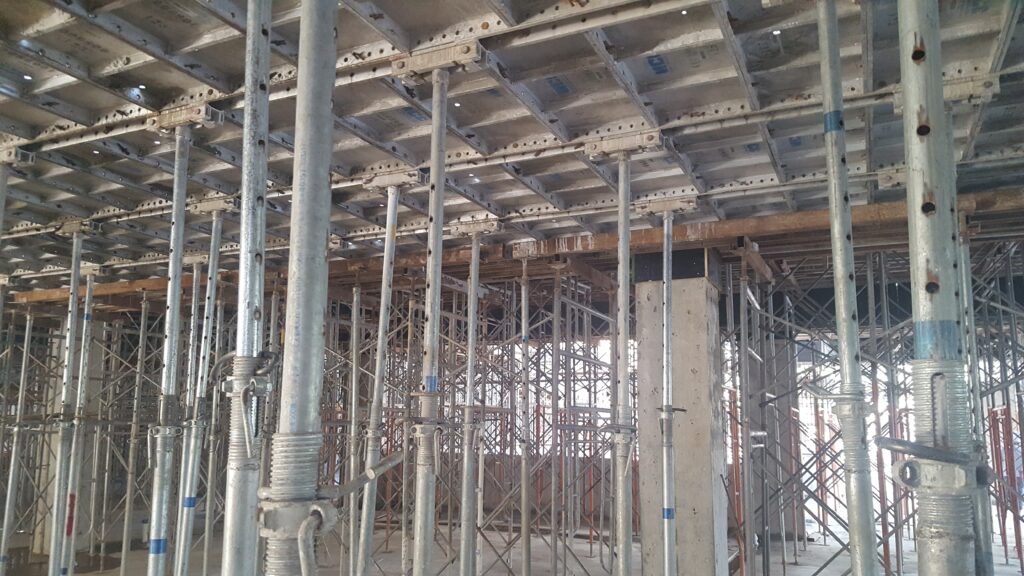
Both aluminum and timber formwork have their respective qualities. For large and complex construction projects, aluminum formwork proves more practical and efficient compared to timber, thanks to its above-mentioned unique advantages. At GETO, we offer high-quality aluminum formwork solutions customized for various structural requirements. With years of experience, robust in-house R&D, and strict quality standards, we have become a trusted name in the industry. Visit our website to explore our dependable building formwork solutions.
The highly anticipated 134th Canton Fair Autumn 2023 is just around the corner, scheduled to be held from October 23rd to October 27th at Canton Fair Complex Guangzhou. As a global construction company, we are delighted to share the news of our participation as an exhibitor, extending a warm invitation for you to explore our booth. We will exhibit our aluminium formwork products, building construction products and decoration materials.
Date: October 23rd to October 27th
Venue: China Import and Export Fair Complex
Area: B Area
Hall: 13.1 Hall
Booth: D09-10
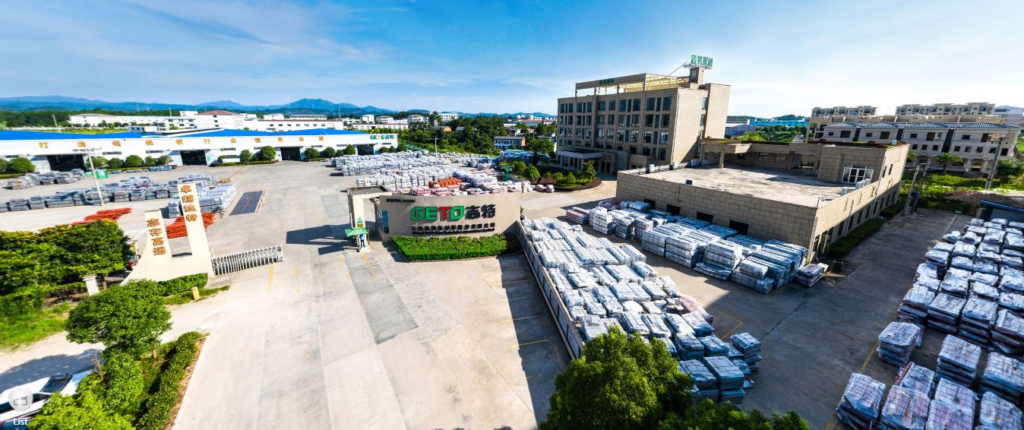
As a global construction company, we are committed to revolutionizing the construction industry with our innovative, high-quality products. Our construction solutions are designed to enhance efficiency, safety, and sustainability. Let’s take a closer look at our offerings:
When contrasted with alternative formwork options, aluminium formwork stands out due to its waterproof and anti-rust properties, making it ideal for time-consuming projects. Our aluminium formwork construction delivers exceptional formwork quality, characterized by remarkable precision and a substantial load-bearing capacity. This not only lowers construction expenses but also ensures rapid construction progress and improved safety measures.
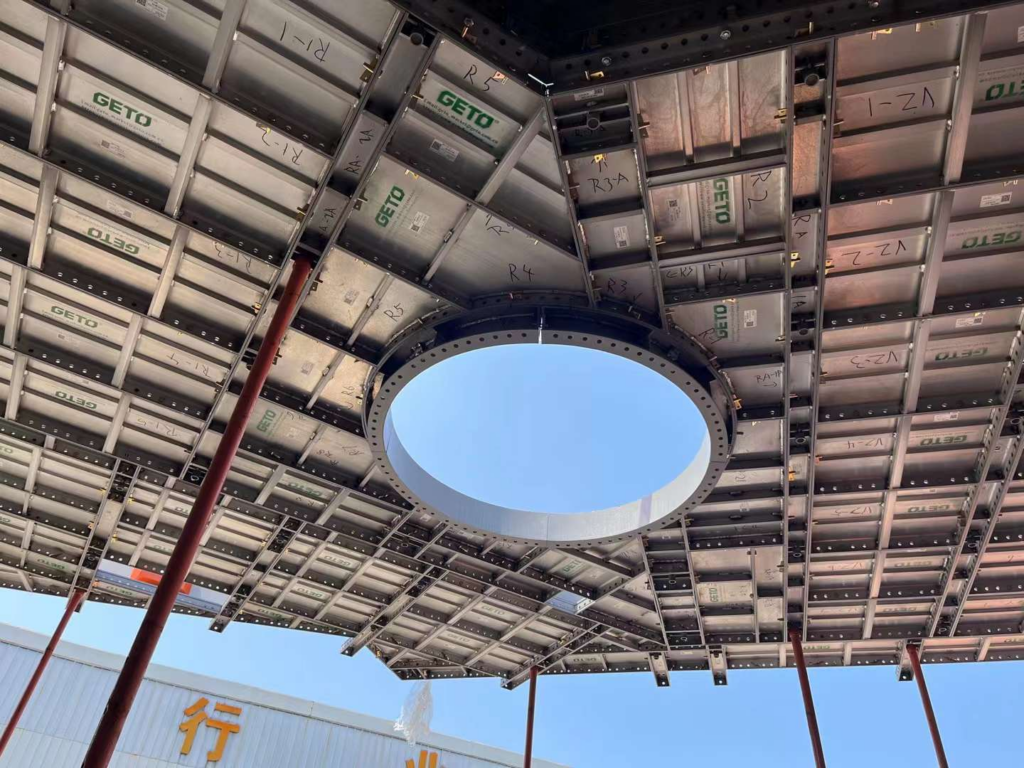
Once assembled, our self-climbing platform remains in use throughout the entire construction process. This leads to substantial cost savings of 30% to 50% per building. It features an all-steel structure, complete integration of equipment, low construction costs, and prolonged utilization, all within a fully enclosed and professionally designed protective system.

Building Materials for Structural Construction
Our building materials are engineered to meet the most stringent structural standards. These materials encompass a range of products, including aluminium sheets, aluminium coils, aluminium beam formwork, and formwork support frames. Together, they assure strength and unwavering reliability.
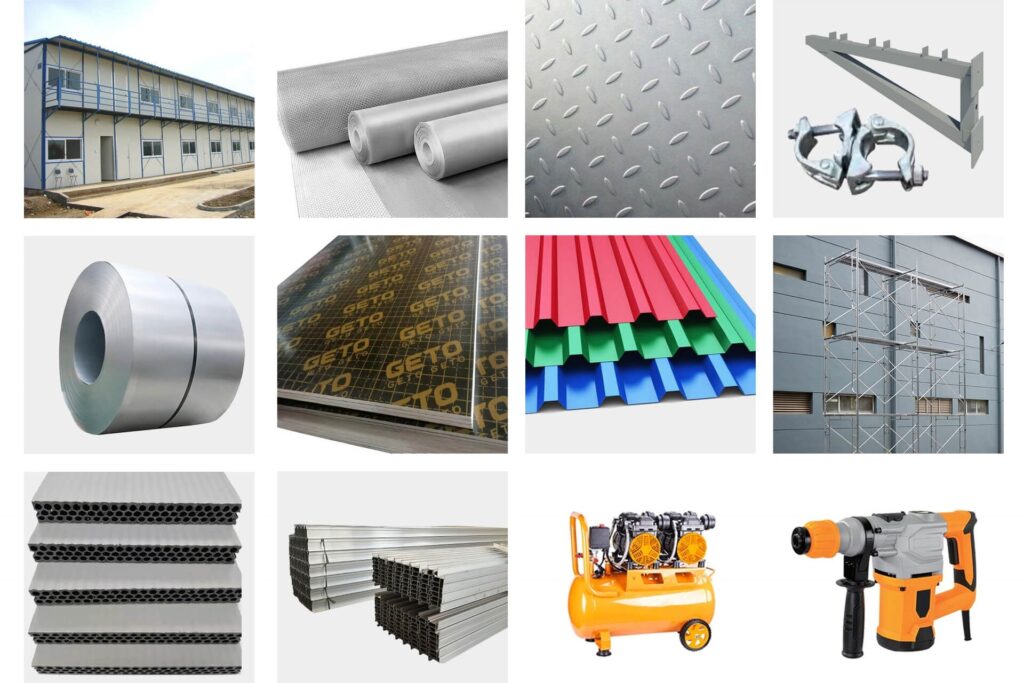
Our PPVC construction offers distinct competitive advantages compared to conventional building technologies. In contrast to traditional formwork, it can boost construction site efficiency by over 50%. Additionally, it alleviates labour-intensive tasks and enhances safety in the construction workplace.
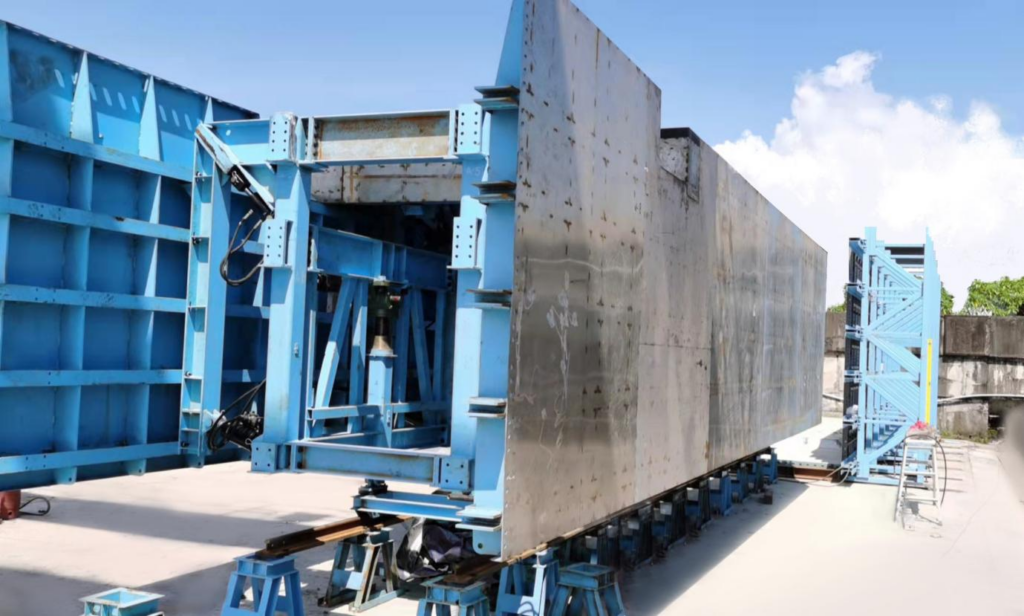
Our Quick-Deck Formwork System has been designed to rapidly and safely construct large slab areas with minimal labour requirements. Its speedy installation and disassembly are achieved by adjusting the height of the adjustable props beneath the deck formwork, where the props are raised for tightening and installation purposes.

This innovative framework is designed for wall construction. It is tailored for casting building structures with stringent waterproofing requirements, particularly those where reinforcement via a tie-rod system, such as in basements, is not feasible.
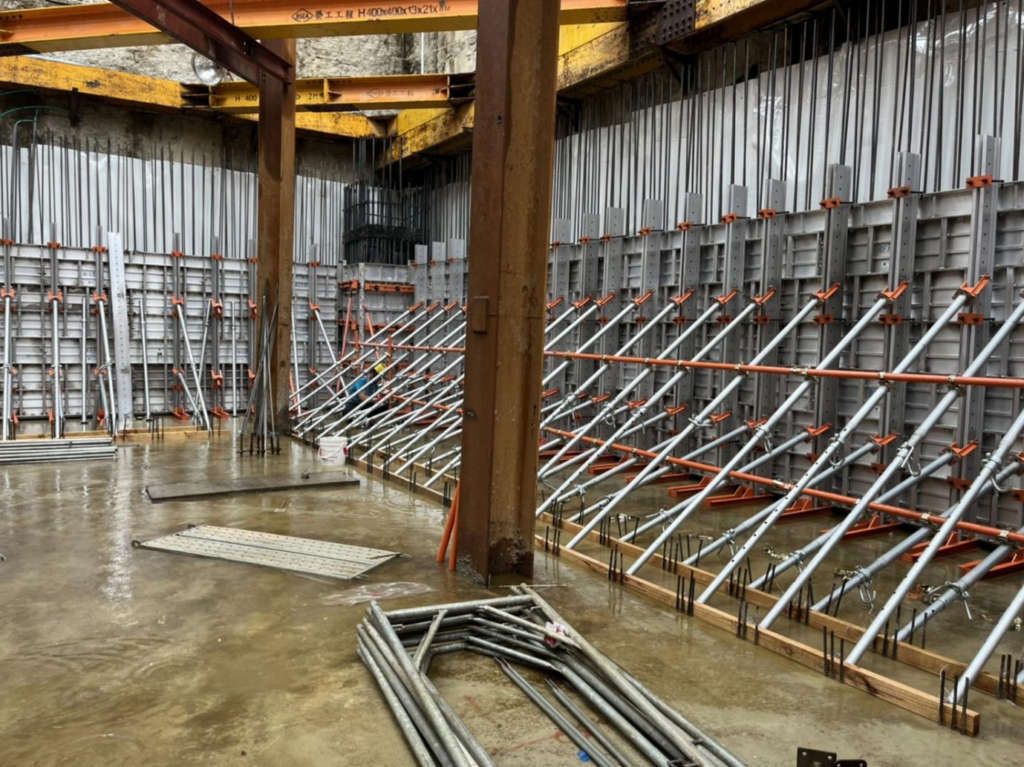
Our table formwork ensures remarkable work efficiency, resulting in labour cost savings of around 50%. It is designed to adhere to the construction schedule, enabling the completion of approximately 5 floors of the structure within one month. Moreover, it guarantees a high-quality concrete casting finish, ensuring an excellent appearance.
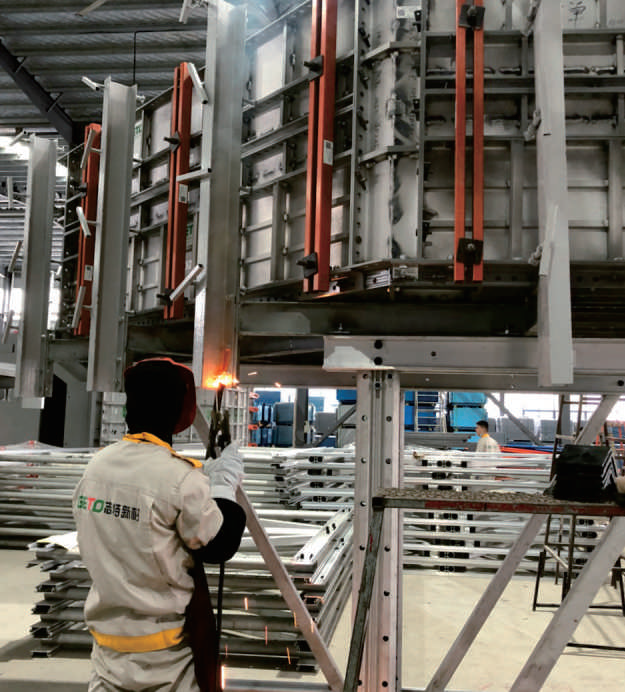
The lifting shaft platform system can be elevated one level at a time using a tower crane. The entire system can be reset by contracting and expanding, providing a holistic and mechanized approach to lift shaft construction.

If you have any lingering questions about our offerings, we will address them at the fair. At the fair, we will illustrate our standing as a global construction company and showcase our products through videos, brochures, interactive product displays, and 3D models. This presents an exceptional chance for you to closely examine these pioneering solutions. Our team will also be present to respond to any inquiries you may have.
At GETO, we have solidified our position as a leading global construction company. We mainly engaged in green new-type building aluminium formwork, self-climbing platform, and assembly PC components. We have developed PPVC precast housing moulds, quick-deck systems, single-side wall frameworks, table formwork, shaft platforms, and other building materials for structural construction. Our business segments cover the realms of civil and public construction in Malaysia and Singapore, among others.
As the Canton Fair Autumn 2023 approaches, we encourage you to visit our booth at the Canton Fair Complex and discover first hand how we, as a global construction company, are shaping the industry and improving construction projects worldwide. You can engage with our team, ask questions, and explore the possibilities that our innovative products offer. So don’t miss this chance to partner with a true global construction company. We look forward to seeing you there!
Published: Oct 16, 2023
Last published: Jun 17, 2023